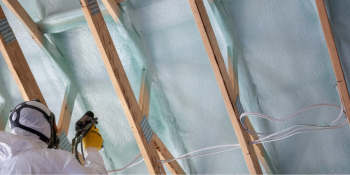Q&A Forums
how should homeowner select contractor or foam supplier? Post New Topic | Post Reply
| Author | Comments |
|---|---|
|
Nathan Partlan
Posted: Dec 11, 2008 12:41 PM
|
how should homeowner select contractor or foam supplier?
So I've done barely enough research here to determine my 2x6 (~5.5 inch depth) rafters filled up with ccSPF will be an ideal or max thickness, and my idea to sister on some 2x2s to increase depth for more foam was silly (chasing the R-49 r-value, you know). I've also seen most of the foam suppliers are in the aged r-value range of 6-7 per inch.So besides references, does my contractor choice come down to just cost? I've read where Mason is not open to providing a best foam supplier (from the perspective of the people here who are employed as applicators), but as a homeowner receiving the service, are there CC foams to stay away from, or others that stand head and shoulders above the rest? If so, this may help narrow down the selection in my area b/c certain application companies only work with certain foam suppliers. If I assume all of the above, what questions should I be asking potential contractors? Am I asking the right questions here or should I be doing a lot more reading? |
|
mason
Posted: Dec 11, 2008 03:02 PM
|
I have written a few articles on selecting contractors and ensuring a quality application. Here are excerpts from those articles Selecting a contractor 1. Contact suppliers for a list of contractors in your area. Should the manufacturer only provide you with a couple of names, keep them handy. There is probably a good reason for the limited recommendations. Also, if more than one manufacturer recommends the same contractor, it’s usually a good sign. 2. Contact related trade groups (such as the Spray Polyurethane Foam Alliance [SPFA] Air Barriers Association of America or National Roofing Contractors Association) for contractors in your area. Ask contractors if they participate in educational programs such as SPFA’s Accreditation Program. 3. Obtain recommendations from friends and associates. (Be sure to compare apples to apples. Hiring a great commercial roofer for a small residential project may be a mistake.) Interview the contractor to determine if the company has the qualities and experience you desire. Some questions to ask your prospective contractor include: What type of roofing system do you install? What type of roofing system do you prefer? How long have you installed the systems? What is your specialty? What is your preference for my particular roof? What regions do you cover? Do you have offices or personnel in those regions? How many crews do you have? Have you ever declared bankruptcy; if so, what were the conditions? Who will perform the work? How are they trained? What certifications, approvals, licenses, or awards does the company have? How does your company address site safety and regulatory compliance? What associations does your company belong to? What is the average length of the roof project of my type? How soon can you schedule the work? What warranties are available? Do you provide maintenance services (including inspections)? How do you handle complaints or call-backs? How do you verify quality? 4. Check references. Most contractors will provide a list of references on projects similar to yours. Be sure to check out enough to get a good understanding of the contractor’s relative performance and customer service. A few helpful questions to ask include: Were you happy with the overall project? Was the contractor reliable, informative, helpful, on time, etc? Were there any misunderstandings? Did the project start and end according to estimates? Do you consider the roof a good investment? How old is the roof? Were there any complaints or problems; if so, did the contractor address your concerns satisfactorily? The information you collect can assist not only in finding the right contractor, but in evaluating pricing differences. With a little effort, you should be able to find a contractor you can trust to do a great job. |
|
mason
Posted: Dec 11, 2008 03:14 PM
|
The article I pasted references roofing but the same process works for insulation and air barrier projects. |
|
quentin
Posted: Dec 12, 2008 10:52 AM
|
Good advise but the ABAA is a real pain and not worth checking in my opinion. I have looked at getting acredited by them since I have had to pass up a lot of work where it is required but if you look at their site they have no future courses planned so anyone can get it. Almost like they have specified contractors they like and want to help drive the rest of us OOB. |
|
Nathan Partlan
Posted: Dec 12, 2008 01:23 PM
|
To Mason's #1 above, does this list cover the major players? BASF BaySystems North America Chemical Design Corporation Dow Chemical Graco Honeywell Huntsman Polyurethanes NCFI Polyurethanes |
|
mason
Posted: Dec 12, 2008 02:40 PM
|
Graco is an equipment manufacturer and may not help with contractor referrals, Honeywell makes blowing agents, same story, same with Huntsman, (makes MDI). Other players include (but not limited to); La Polla, Corbond, Demilec, Icynene, Bio Based Insulation, Resin Technology, E R Systems, SWD Urethanes, Gaco Western, and more. Also, there are distributors such as Energy Independence, Foampak, National Insulation, United Building Products, Foam Materials and Coating, Air Tite Insulation, Sprayfoam Distributors of New England, etc. Sorry if I left any out. Check with the supplier lists on sprayfoammagazine.com for more listings. |
|
philip mullins
Posted: Jan 02, 2009 12:47 AM
|
mason makes some good points. but, imho you are looking at selecting your applicator from the wrong perspective. all of the suppliers listed have a good product. and sure they can give you a list of applicators who buy from them. what are the odds that they have ever even met the guy? much less seen his work? you need to select the type of foam that suits your needs and your budget. past that its betty crocker and dunkin heinz. sure, thier are slight differences in the chemical make up from brand to brand. and sales guys can spew a lot of information to convince you thiers is better...2 pound density foam is 2 pound density foam (when properly applied. for the most part, your gonna have to send it off to a lab to tell the difference. some manufacturers add color to thier product. they do this cause it is just about the only way to tell thier foam from the competition. most of the r&d done by the manufacturer is finding ways to increase yeild (yeild is money for an applicator) and ease of use (again, more money) so that we will buy thier product. i dont care if its a swimming pool, a deck, a sheetrock guy, etc... it is the quality of the application that counts. this is especialy true in the coatings industry! so, how do you select the wright guy? tough question. refernces are great but, can be misleading. one could do a pretty good job and the customer be tickled to death to be saving 30% on utilities when infact, a great job would be saving him 40-50%. but, you darn sure dont wanna hire the guy with bad or no references. your gonna here a lot of crap if your gonna get a lot of bids. i would personaly look out for the guy who hands you a bunch of reasons why one type (oc/cc) of foam is BAD. aint none of this stuff gonna rot your house, or any of the other crap you will undoubtedly here, if installed properly. applied wrong and it may burn your house to the ground, or make your family sick. not likely, but very possible.talkin bad about foam and selling foam at the same time... some of the people, some of the time. your looking for someone who is honest, hard working and takes pride in his work. you want to make sure when comparing bids that you are comparing apples to apples. what all is included in the price (depth of foam, clean up, caulking, scraping, seal pack...)? i would suggest that you go with your gut. look the guy in the eye, ask specific questions and listen to his answers and suggestions carefuly. if he tells you what he sprays and how it works and what it cost, and doesnt try to sell you something you dont want, and his references check out.. if you feel good about the guy, he might be your man. i would never hire anyone for anything just cause he is the cheapest. you will usualy get what you pay for, no matter how nice his suppliers website is. |
|
mason
Posted: Jan 02, 2009 07:48 AM
|
Troutkiller, I agree with your final advice on getting a "feel" for your contractor. Most people get a good sense when someone is blowing smoke in their eyes. But, some contractors talk a great line and don't do the work. But, I do take exception to the supplier comments. I have worked with and seen the manufacturing and QC departments of over 100 foam suppliers, I can tell you they can vary quite a bit. But, the most common concern of each manufacturer is making a foam that the average contractor can install with the least amount of head aches, change in pressure, temperature and with the same equipment as the competitors. Some companies have excellent technical service reps available with a phone call. And many visit their contractors frequently to get a first hand perspective of their work. For example, when I was with Carpenter in the 80s and UCSC in the 90s and I visted every contractor that we sold foam to and made a written report to the company on their relative quality, technical skills, equipment maintenance, etc. While running the techncial department and sales department at Gusmer I visited more than 50 foam suppliers in the US and more than 30 internationally (South America, Korea, Japan, Mexico) This provided me with a very good idea of how suppliers and contractors make and install their foam. I also understand that companies can change within a short period of time for the better or for the worse. That is why I hesistate to provide specific names of companies that provide great, mediocre or bad service or products. Lets say that great tech rep from a supplier goes to work for another company or gets laid off and the supplier's technical service goes down with it. Or a company gets acquired by another. Do they make an easy transition, keep the good products and personnel or make poor decisions and get rid of their strengths. Conversely, lets say a company has a poor product but a great attitude and willingness to spend the time and money to get it right. They may produce a poor product and technical services for a while, but then they get it right and have loyal customers for decades after. I know of 4-5 major suppliers right now that this description applies to. I don't mean to make it difficult, but if multiple suppliers recommend the same contractor it is a very good sign. References are important, ask all of the good questions and you will find out if that contractor knows what they are doing. Plus as a building owner, educate yourself in the industry guidelines and best practices. SPFA has technical guidelines on roofing, insulation, spraying attics, metal buildings, below grade, cold storage and more, There are ASTM guide specifications on SPF roofing and material standards for foam and coatings. Check these out and make sure the contractor is following industry best practices. Thanks for the comments, it makes this forum that much more valuble. |





























